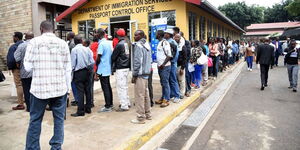The Independent Electoral and Boundaries Commission (IEBC) has responded to criticism over the scheduled date for upcoming by-elections, maintaining that the decision to hold them on November 27 does not violate the law.
This clarification follows concerns raised by Nairobi Senator and ODM Secretary General Edwin Sifuna, who argued that the Commission had acted against the Constitution in setting the dates.
In a statement on Sunday, August 10, Sifuna claimed that recent IEBC decisions, including the timeline for the by-elections, were alarming and potentially unconstitutional.
“Two back-to-back manifestly flawed decisions by the new IEBC are enough cause for alarm,” Sifuna stated.
He pointed to Article 101(4)(b) of the Constitution, which requires by-elections to be held within 90 days of issuing writs, noting that November 27 was more than 100 days away.
However, in its statement dated August 13, the IEBC explained that the vacancies in question occurred long before the current Commission was constituted, creating exceptional circumstances.
The electoral body cited cases such as the Baringo Senate seat, which became vacant on February 16, 2025, and Banissa Constituency, which has lacked a representative since March 28, 2023.
Other affected areas include Magarini Constituency (vacant since March 3, 2023), Ugunja Constituency (August 8, 2024), Malava Constituency (February 17, 2025), Mbeere North Constituency (April 17, 2025), and Kasipul Constituency (April 30, 2025).
The Commission stated that it relied on Article 259 of the Constitution, which allows for flexibility in interpreting timelines when circumstances have prevented compliance, as long as the guiding spirit of the Constitution is upheld.
IEBC added that the 90-day requirement applies under normal circumstances, but logistical factors had to be considered, such as many polling stations being located in schools that were in session during the earlier period.
''In line with these principles, the Commission considered both legal and logistical realities. Notably, many polling stations are located in schools, which are in session during the initial 90-day period. Conducting elections during school terms disrupts learning and limits access to polling centers,'' a statement from IEBC read in part.
The Commission noted that holding polls during school terms disrupts learning and limits access to voting facilities; hence, the decision to push the date forward.
It also stressed that the Constitution does not specify a fixed timeframe for filling vacant MCA seats and that its decision on the November 27 date is in line with constitutional principles of promoting the rule of law, good governance, and public convenience.












